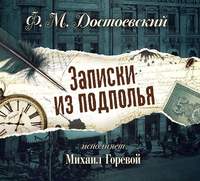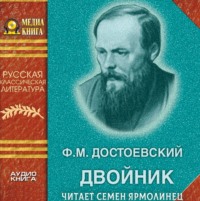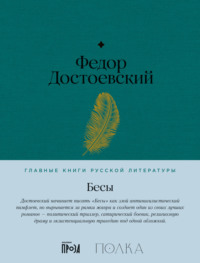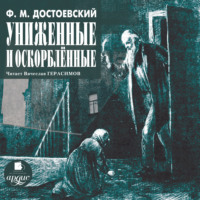 полная версия
полная версияThe Brothers Karamazov
This was unmistakably said with some malice and obviously with intention; even perhaps with no desire to conceal that he spoke ironically and with intention.
“Oh, dear, how mistaken it all is!” Madame Hohlakov cried again.
“Alexey Fyodorovitch, you speak. I want dreadfully to know what you will say!” cried Katerina Ivanovna, and burst into tears. Alyosha got up from the sofa.
“It's nothing, nothing!” she went on through her tears. “I'm upset, I didn't sleep last night. But by the side of two such friends as you and your brother I still feel strong – for I know – you two will never desert me.”
“Unluckily I am obliged to return to Moscow – perhaps to-morrow – and to leave you for a long time – And, unluckily, it's unavoidable,” Ivan said suddenly.
“To-morrow – to Moscow!” her face was suddenly contorted; “but – but, dear me, how fortunate!” she cried in a voice suddenly changed. In one instant there was no trace left of her tears. She underwent an instantaneous transformation, which amazed Alyosha. Instead of a poor, insulted girl, weeping in a sort of “laceration,” he saw a woman completely self-possessed and even exceedingly pleased, as though something agreeable had just happened.
“Oh, not fortunate that I am losing you, of course not,” she corrected herself suddenly, with a charming society smile. “Such a friend as you are could not suppose that. I am only too unhappy at losing you.” She rushed impulsively at Ivan, and seizing both his hands, pressed them warmly. “But what is fortunate is that you will be able in Moscow to see auntie and Agafya and to tell them all the horror of my present position. You can speak with complete openness to Agafya, but spare dear auntie. You will know how to do that. You can't think how wretched I was yesterday and this morning, wondering how I could write them that dreadful letter – for one can never tell such things in a letter… Now it will be easy for me to write, for you will see them and explain everything. Oh, how glad I am! But I am only glad of that, believe me. Of course, no one can take your place… I will run at once to write the letter,” she finished suddenly, and took a step as though to go out of the room.
“And what about Alyosha and his opinion, which you were so desperately anxious to hear?” cried Madame Hohlakov. There was a sarcastic, angry note in her voice.
“I had not forgotten that,” cried Katerina Ivanovna, coming to a sudden standstill, “and why are you so antagonistic at such a moment?” she added, with warm and bitter reproachfulness. “What I said, I repeat. I must have his opinion. More than that, I must have his decision! As he says, so it shall be. You see how anxious I am for your words, Alexey Fyodorovitch… But what's the matter?”
“I couldn't have believed it. I can't understand it!” Alyosha cried suddenly in distress.
“What? What?”
“He is going to Moscow, and you cry out that you are glad. You said that on purpose! And you begin explaining that you are not glad of that but sorry to be – losing a friend. But that was acting, too – you were playing a part – as in a theater!”
“In a theater? What? What do you mean?” exclaimed Katerina Ivanovna, profoundly astonished, flushing crimson, and frowning.
“Though you assure him you are sorry to lose a friend in him, you persist in telling him to his face that it's fortunate he is going,” said Alyosha breathlessly. He was standing at the table and did not sit down.
“What are you talking about? I don't understand.”
“I don't understand myself… I seemed to see in a flash … I know I am not saying it properly, but I'll say it all the same,” Alyosha went on in the same shaking and broken voice. “What I see is that perhaps you don't love Dmitri at all … and never have, from the beginning… And Dmitri, too, has never loved you … and only esteems you… I really don't know how I dare to say all this, but somebody must tell the truth … for nobody here will tell the truth.”
“What truth?” cried Katerina Ivanovna, and there was an hysterical ring in her voice.
“I'll tell you,” Alyosha went on with desperate haste, as though he were jumping from the top of a house. “Call Dmitri; I will fetch him – and let him come here and take your hand and take Ivan's and join your hands. For you're torturing Ivan, simply because you love him – and torturing him, because you love Dmitri through ‘self-laceration’ – with an unreal love – because you've persuaded yourself.”
Alyosha broke off and was silent.
“You … you … you are a little religious idiot – that's what you are!” Katerina Ivanovna snapped. Her face was white and her lips were moving with anger.
Ivan suddenly laughed and got up. His hat was in his hand.
“You are mistaken, my good Alyosha,” he said, with an expression Alyosha had never seen in his face before – an expression of youthful sincerity and strong, irresistibly frank feeling. “Katerina Ivanovna has never cared for me! She has known all the time that I cared for her – though I never said a word of my love to her – she knew, but she didn't care for me. I have never been her friend either, not for one moment; she is too proud to need my friendship. She kept me at her side as a means of revenge. She revenged with me and on me all the insults which she has been continually receiving from Dmitri ever since their first meeting. For even that first meeting has rankled in her heart as an insult – that's what her heart is like! She has talked to me of nothing but her love for him. I am going now; but, believe me, Katerina Ivanovna, you really love him. And the more he insults you, the more you love him – that's your ‘laceration.’ You love him just as he is; you love him for insulting you. If he reformed, you'd give him up at once and cease to love him. But you need him so as to contemplate continually your heroic fidelity and to reproach him for infidelity. And it all comes from your pride. Oh, there's a great deal of humiliation and self-abasement about it, but it all comes from pride… I am too young and I've loved you too much. I know that I ought not to say this, that it would be more dignified on my part simply to leave you, and it would be less offensive for you. But I am going far away, and shall never come back… It is for ever. I don't want to sit beside a ‘laceration.’… But I don't know how to speak now. I've said everything… Good-by, Katerina Ivanovna; you can't be angry with me, for I am a hundred times more severely punished than you, if only by the fact that I shall never see you again. Good-by! I don't want your hand. You have tortured me too deliberately for me to be able to forgive you at this moment. I shall forgive you later, but now I don't want your hand. ‘Den Dank, Dame, begehr ich nicht,’ ” he added, with a forced smile, showing, however, that he could read Schiller, and read him till he knew him by heart – which Alyosha would never have believed. He went out of the room without saying good-by even to his hostess, Madame Hohlakov. Alyosha clasped his hands.
“Ivan!” he cried desperately after him. “Come back, Ivan! No, nothing will induce him to come back now!” he cried again, regretfully realizing it; “but it's my fault, my fault. I began it! Ivan spoke angrily, wrongly. Unjustly and angrily. He must come back here, come back,” Alyosha kept exclaiming frantically.
Katerina Ivanovna went suddenly into the next room.
“You have done no harm. You behaved beautifully, like an angel,” Madame Hohlakov whispered rapidly and ecstatically to Alyosha. “I will do my utmost to prevent Ivan Fyodorovitch from going.”
Her face beamed with delight, to the great distress of Alyosha, but Katerina Ivanovna suddenly returned. She had two hundred-rouble notes in her hand.
“I have a great favor to ask of you, Alexey Fyodorovitch,” she began, addressing Alyosha with an apparently calm and even voice, as though nothing had happened. “A week – yes, I think it was a week ago – Dmitri Fyodorovitch was guilty of a hasty and unjust action – a very ugly action. There is a low tavern here, and in it he met that discharged officer, that captain, whom your father used to employ in some business. Dmitri Fyodorovitch somehow lost his temper with this captain, seized him by the beard and dragged him out into the street and for some distance along it, in that insulting fashion. And I am told that his son, a boy, quite a child, who is at the school here, saw it and ran beside them crying and begging for his father, appealing to every one to defend him, while every one laughed. You must forgive me, Alexey Fyodorovitch, I cannot think without indignation of that disgraceful action of his … one of those actions of which only Dmitri Fyodorovitch would be capable in his anger … and in his passions! I can't describe it even… I can't find my words. I've made inquiries about his victim, and find he is quite a poor man. His name is Snegiryov. He did something wrong in the army and was discharged. I can't tell you what. And now he has sunk into terrible destitution, with his family – an unhappy family of sick children, and, I believe, an insane wife. He has been living here a long time; he used to work as a copying clerk, but now he is getting nothing. I thought if you … that is I thought … I don't know. I am so confused. You see, I wanted to ask you, my dear Alexey Fyodorovitch, to go to him, to find some excuse to go to them – I mean to that captain – oh, goodness, how badly I explain it! – and delicately, carefully, as only you know how to” (Alyosha blushed), “manage to give him this assistance, these two hundred roubles. He will be sure to take it… I mean, persuade him to take it… Or, rather, what do I mean? You see it's not by way of compensation to prevent him from taking proceedings (for I believe he meant to), but simply a token of sympathy, of a desire to assist him from me, Dmitri Fyodorovitch's betrothed, not from himself… But you know… I would go myself, but you'll know how to do it ever so much better. He lives in Lake Street, in the house of a woman called Kalmikov… For God's sake, Alexey Fyodorovitch, do it for me, and now … now I am rather … tired. Good-by!”
She turned and disappeared behind the portière so quickly that Alyosha had not time to utter a word, though he wanted to speak. He longed to beg her pardon, to blame himself, to say something, for his heart was full and he could not bear to go out of the room without it. But Madame Hohlakov took him by the hand and drew him along with her. In the hall she stopped him again as before.
“She is proud, she is struggling with herself; but kind, charming, generous,” she exclaimed, in a half-whisper. “Oh, how I love her, especially sometimes, and how glad I am again of everything! Dear Alexey Fyodorovitch, you didn't know, but I must tell you, that we all, all – both her aunts, I and all of us, Lise, even – have been hoping and praying for nothing for the last month but that she may give up your favorite Dmitri, who takes no notice of her and does not care for her, and may marry Ivan Fyodorovitch – such an excellent and cultivated young man, who loves her more than anything in the world. We are in a regular plot to bring it about, and I am even staying on here perhaps on that account.”
“But she has been crying – she has been wounded again,” cried Alyosha.
“Never trust a woman's tears, Alexey Fyodorovitch. I am never for the women in such cases. I am always on the side of the men.”
“Mamma, you are spoiling him,” Lise's little voice cried from behind the door.
“No, it was all my fault. I am horribly to blame,” Alyosha repeated unconsoled, hiding his face in his hands in an agony of remorse for his indiscretion.
“Quite the contrary; you behaved like an angel, like an angel. I am ready to say so a thousand times over.”
“Mamma, how has he behaved like an angel?” Lise's voice was heard again.
“I somehow fancied all at once,” Alyosha went on as though he had not heard Lise, “that she loved Ivan, and so I said that stupid thing… What will happen now?”
“To whom, to whom?” cried Lise. “Mamma, you really want to be the death of me. I ask you and you don't answer.”
At the moment the maid ran in.
“Katerina Ivanovna is ill… She is crying, struggling … hysterics.”
“What is the matter?” cried Lise, in a tone of real anxiety. “Mamma, I shall be having hysterics, and not she!”
“Lise, for mercy's sake, don't scream, don't persecute me. At your age one can't know everything that grown-up people know. I'll come and tell you everything you ought to know. Oh, mercy on us! I am coming, I am coming… Hysterics is a good sign, Alexey Fyodorovitch; it's an excellent thing that she is hysterical. That's just as it ought to be. In such cases I am always against the woman, against all these feminine tears and hysterics. Run and say, Yulia, that I'll fly to her. As for Ivan Fyodorovitch's going away like that, it's her own fault. But he won't go away. Lise, for mercy's sake, don't scream! Oh, yes; you are not screaming. It's I am screaming. Forgive your mamma; but I am delighted, delighted, delighted! Did you notice, Alexey Fyodorovitch, how young, how young Ivan Fyodorovitch was just now when he went out, when he said all that and went out? I thought he was so learned, such a savant, and all of a sudden he behaved so warmly, openly, and youthfully, with such youthful inexperience, and it was all so fine, like you… And the way he repeated that German verse, it was just like you! But I must fly, I must fly! Alexey Fyodorovitch, make haste to carry out her commission, and then make haste back. Lise, do you want anything now? For mercy's sake, don't keep Alexey Fyodorovitch a minute. He will come back to you at once.”
Madame Hohlakov at last ran off. Before leaving, Alyosha would have opened the door to see Lise.
“On no account,” cried Lise. “On no account now. Speak through the door. How have you come to be an angel? That's the only thing I want to know.”
“For an awful piece of stupidity, Lise! Good-by!”
“Don't dare to go away like that!” Lise was beginning.
“Lise, I have a real sorrow! I'll be back directly, but I have a great, great sorrow!”
And he ran out of the room.
Chapter VI. A Laceration In The Cottage
He certainly was really grieved in a way he had seldom been before. He had rushed in like a fool, and meddled in what? In a love-affair. “But what do I know about it? What can I tell about such things?” he repeated to himself for the hundredth time, flushing crimson. “Oh, being ashamed would be nothing; shame is only the punishment I deserve. The trouble is I shall certainly have caused more unhappiness… And Father Zossima sent me to reconcile and bring them together. Is this the way to bring them together?” Then he suddenly remembered how he had tried to join their hands, and he felt fearfully ashamed again. “Though I acted quite sincerely, I must be more sensible in the future,” he concluded suddenly, and did not even smile at his conclusion.
Katerina Ivanovna's commission took him to Lake Street, and his brother Dmitri lived close by, in a turning out of Lake Street. Alyosha decided to go to him in any case before going to the captain, though he had a presentiment that he would not find his brother. He suspected that he would intentionally keep out of his way now, but he must find him anyhow. Time was passing: the thought of his dying elder had not left Alyosha for one minute from the time he set off from the monastery.
There was one point which interested him particularly about Katerina Ivanovna's commission; when she had mentioned the captain's son, the little schoolboy who had run beside his father crying, the idea had at once struck Alyosha that this must be the schoolboy who had bitten his finger when he, Alyosha, asked him what he had done to hurt him. Now Alyosha felt practically certain of this, though he could not have said why. Thinking of another subject was a relief, and he resolved to think no more about the “mischief” he had done, and not to torture himself with remorse, but to do what he had to do, let come what would. At that thought he was completely comforted. Turning to the street where Dmitri lodged, he felt hungry, and taking out of his pocket the roll he had brought from his father's, he ate it. It made him feel stronger.
Dmitri was not at home. The people of the house, an old cabinet-maker, his son, and his old wife, looked with positive suspicion at Alyosha. “He hasn't slept here for the last three nights. Maybe he has gone away,” the old man said in answer to Alyosha's persistent inquiries. Alyosha saw that he was answering in accordance with instructions. When he asked whether he were not at Grushenka's or in hiding at Foma's (Alyosha spoke so freely on purpose), all three looked at him in alarm. “They are fond of him, they are doing their best for him,” thought Alyosha. “That's good.”
At last he found the house in Lake Street. It was a decrepit little house, sunk on one side, with three windows looking into the street, and with a muddy yard, in the middle of which stood a solitary cow. He crossed the yard and found the door opening into the passage. On the left of the passage lived the old woman of the house with her old daughter. Both seemed to be deaf. In answer to his repeated inquiry for the captain, one of them at last understood that he was asking for their lodgers, and pointed to a door across the passage. The captain's lodging turned out to be a simple cottage room. Alyosha had his hand on the iron latch to open the door, when he was struck by the strange hush within. Yet he knew from Katerina Ivanovna's words that the man had a family. “Either they are all asleep or perhaps they have heard me coming and are waiting for me to open the door. I'd better knock first,” and he knocked. An answer came, but not at once, after an interval of perhaps ten seconds.
“Who's there?” shouted some one in a loud and very angry voice.
Then Alyosha opened the door and crossed the threshold. He found himself in a regular peasant's room. Though it was large, it was cumbered up with domestic belongings of all sorts, and there were several people in it. On the left was a large Russian stove. From the stove to the window on the left was a string running across the room, and on it there were rags hanging. There was a bedstead against the wall on each side, right and left, covered with knitted quilts. On the one on the left was a pyramid of four print-covered pillows, each smaller than the one beneath. On the other there was only one very small pillow. The opposite corner was screened off by a curtain or a sheet hung on a string. Behind this curtain could be seen a bed made up on a bench and a chair. The rough square table of plain wood had been moved into the middle window. The three windows, which consisted each of four tiny greenish mildewy panes, gave little light, and were close shut, so that the room was not very light and rather stuffy. On the table was a frying-pan with the remains of some fried eggs, a half-eaten piece of bread, and a small bottle with a few drops of vodka.
A woman of genteel appearance, wearing a cotton gown, was sitting on a chair by the bed on the left. Her face was thin and yellow, and her sunken cheeks betrayed at the first glance that she was ill. But what struck Alyosha most was the expression in the poor woman's eyes – a look of surprised inquiry and yet of haughty pride. And while he was talking to her husband, her big brown eyes moved from one speaker to the other with the same haughty and questioning expression. Beside her at the window stood a young girl, rather plain, with scanty reddish hair, poorly but very neatly dressed. She looked disdainfully at Alyosha as he came in. Beside the other bed was sitting another female figure. She was a very sad sight, a young girl of about twenty, but hunchback and crippled “with withered legs,” as Alyosha was told afterwards. Her crutches stood in the corner close by. The strikingly beautiful and gentle eyes of this poor girl looked with mild serenity at Alyosha. A man of forty-five was sitting at the table, finishing the fried eggs. He was spare, small and weakly built. He had reddish hair and a scanty light-colored beard, very much like a wisp of tow (this comparison and the phrase “a wisp of tow” flashed at once into Alyosha's mind for some reason, he remembered it afterwards). It was obviously this gentleman who had shouted to him, as there was no other man in the room. But when Alyosha went in, he leapt up from the bench on which he was sitting, and, hastily wiping his mouth with a ragged napkin, darted up to Alyosha.
“It's a monk come to beg for the monastery. A nice place to come to!” the girl standing in the left corner said aloud. The man spun round instantly towards her and answered her in an excited and breaking voice:
“No, Varvara, you are wrong. Allow me to ask,” he turned again to Alyosha, “what has brought you to – our retreat?”
Alyosha looked attentively at him. It was the first time he had seen him. There was something angular, flurried and irritable about him. Though he had obviously just been drinking, he was not drunk. There was extraordinary impudence in his expression, and yet, strange to say, at the same time there was fear. He looked like a man who had long been kept in subjection and had submitted to it, and now had suddenly turned and was trying to assert himself. Or, better still, like a man who wants dreadfully to hit you but is horribly afraid you will hit him. In his words and in the intonation of his shrill voice there was a sort of crazy humor, at times spiteful and at times cringing, and continually shifting from one tone to another. The question about “our retreat” he had asked as it were quivering all over, rolling his eyes, and skipping up so close to Alyosha that he instinctively drew back a step. He was dressed in a very shabby dark cotton coat, patched and spotted. He wore checked trousers of an extremely light color, long out of fashion, and of very thin material. They were so crumpled and so short that he looked as though he had grown out of them like a boy.
“I am Alexey Karamazov,” Alyosha began in reply.
“I quite understand that, sir,” the gentleman snapped out at once to assure him that he knew who he was already. “I am Captain Snegiryov, sir, but I am still desirous to know precisely what has led you – ”
“Oh, I've come for nothing special. I wanted to have a word with you – if only you allow me.”
“In that case, here is a chair, sir; kindly be seated. That's what they used to say in the old comedies, ‘kindly be seated,’ ” and with a rapid gesture he seized an empty chair (it was a rough wooden chair, not upholstered) and set it for him almost in the middle of the room; then, taking another similar chair for himself, he sat down facing Alyosha, so close to him that their knees almost touched.
“Nikolay Ilyitch Snegiryov, sir, formerly a captain in the Russian infantry, put to shame for his vices, but still a captain. Though I might not be one now for the way I talk; for the last half of my life I've learnt to say ‘sir.’ It's a word you use when you've come down in the world.”
“That's very true,” smiled Alyosha. “But is it used involuntarily or on purpose?”
“As God's above, it's involuntary, and I usen't to use it! I didn't use the word ‘sir’ all my life, but as soon as I sank into low water I began to say ‘sir.’ It's the work of a higher power. I see you are interested in contemporary questions, but how can I have excited your curiosity, living as I do in surroundings impossible for the exercise of hospitality?”
“I've come – about that business.”
“About what business?” the captain interrupted impatiently.
“About your meeting with my brother Dmitri Fyodorovitch,” Alyosha blurted out awkwardly.
“What meeting, sir? You don't mean that meeting? About my ‘wisp of tow,’ then?” He moved closer so that his knees positively knocked against Alyosha. His lips were strangely compressed like a thread.
“What wisp of tow?” muttered Alyosha.
“He is come to complain of me, father!” cried a voice familiar to Alyosha – the voice of the schoolboy – from behind the curtain. “I bit his finger just now.” The curtain was pulled, and Alyosha saw his assailant lying on a little bed made up on the bench and the chair in the corner under the ikons. The boy lay covered by his coat and an old wadded quilt. He was evidently unwell, and, judging by his glittering eyes, he was in a fever. He looked at Alyosha without fear, as though he felt he was at home and could not be touched.









